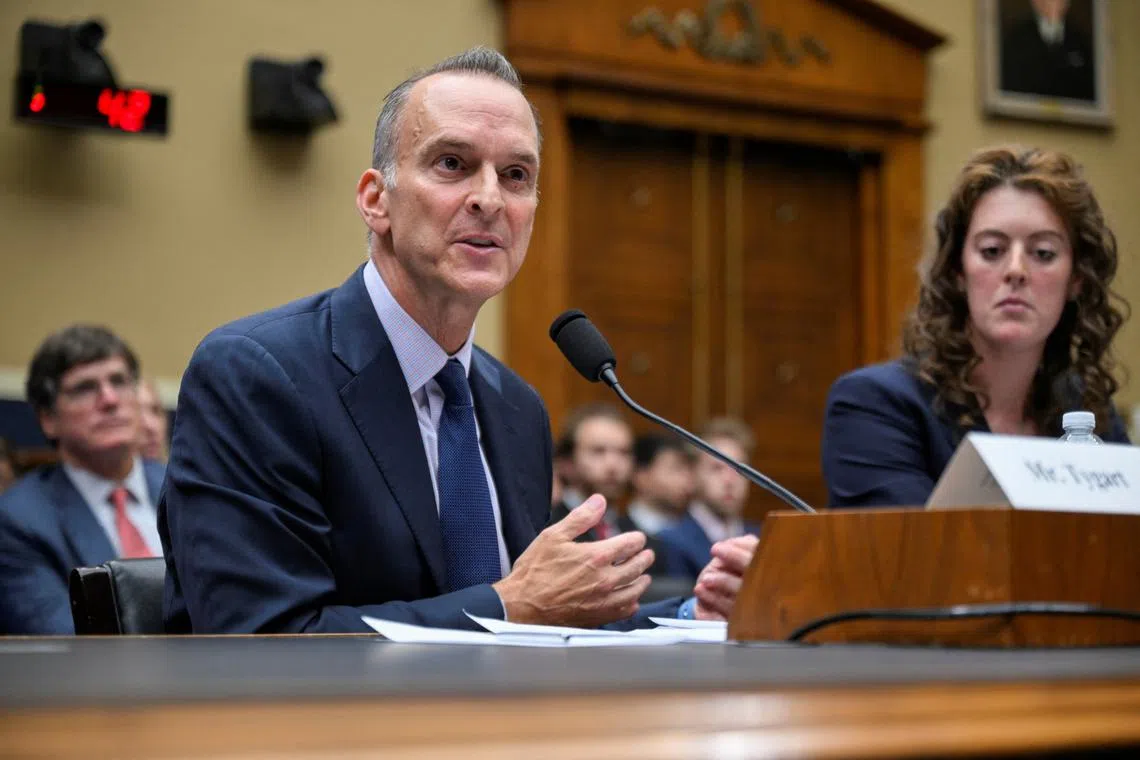Usada chief Travis Tygart sceptical of investigation into Chinese doping
Sign up now: Get the biggest sports news in your inbox

US Anti-Doping Agency CEO Travis Tygart testifies before a hearing on anti-doping measures on June 25.
PHOTO: REUTERS
NEW YORK – Travis Tygart, head of the United States Anti-Doping Agency (Usada), said on July 8 he had doubts about the effectiveness of an investigation into the positive drug tests by 23 Chinese swimmers.
The World Anti-Doping Agency (Wada) has faced mounting pressure to explain how Chinese swimmers tested positive for a banned substance
A report by Swiss prosecutor Eric Cottier looking if proper procedures were followed by anti-doping and swimming officials is expected to be made public on July 9, but Tygart was not waiting for the findings, calling the investigation, “more of a self-serving check-the-box type of exercise”.
“We were ultimately glad that Wada was forced to have an independent review,” said Tygart in a video message to American athletes.
“We, of course, were disappointed that the very staff whose decisions in this process were at question were the ones to set the terms of reference for this review.
“We have seen in anti-doping and other sport movement situations whitewash type reports when they hire these independent people.”
Wada has conceded Chinese doping officials could have handled the matter better. But it has vigorously defended its handling of the case, saying it followed rules laid out in the anti-doping code and has no authority to impose provisional suspensions.
The New York Times reported in April that the 23 Chinese swimmers tested positive for trimetazidine (TMZ), a medication that increases blood flow to the heart and is used to treat angina.
The swimmers were cleared by a Chinese investigation, which said they were inadvertently exposed to the drug through contamination.
The report determined the swimmers were staying at a hotel where traces of TMZ were discovered in the kitchen.
China’s anti-doping agency, Chinada, disputed the reporting by the NYT and accused the newspaper of violating “media ethics and morals”.
A Global Times editorial accused rival nations of intentionally “manipulating the issue of doping” and “smearing China’s swimming programme”.
Wada said it had no evidence to challenge China’s findings and that external counsel had advised against appealing them.
While Tygart remains sceptical, the findings of Cottier’s report could ease some of the criticism on Wada, who confirmed last week that it was aware the matter is being investigated by US law enforcement.
A US House of Representatives committee in May called on the Department of Justice (DOJ) to launch inquiries ahead of the 2024 Paris Olympics into the Chinese doping cases.
Tygart said if the Cottier report does not provide answers, then a US-backed investigation will and called for those found responsible to be held accountable.
“Days ago, the international federation for swimming acknowledged a federal law enforcement investigation into this situation,” said Tygart.
“Let’s hope that if this Wada review doesn’t get to the bottom of it that, then that reported (US) investigation will ultimately hold the organisations accountable to the extent that they can.”
Any DOJ investigation would fall under the Rodchenkov Act passed in 2020. It extends US law enforcement jurisdiction to any international sporting competitions that involve American athletes or have financial connections to the US.
Named after Grigory Rodchenkov, a former Russian anti-doping laboratory head who turned whistleblower and helped expose Russia’s state-sponsored doping, the Act criminalises doping schemes intended to influence sports events and allows US prosecutors to seek prison terms of up to 10 years and fines of up to US$1 million (S$1.4 million).
Earlier in 2024, Texan Eric Lira became the first person charged under the Act.
He pleaded guilty and was sentenced to three months in prison for his involvement in providing banned performance-enhancing drugs to athletes before the delayed Tokyo 2020 Games.
However, Wada has voiced concerns that the Act has destabilised the global anti-doping effort.
“The public reports about this investigation validate the concerns expressed broadly by the international community about the passage of the Rodchenkov Act, under which the United States purports to exercise extraterritorial criminal jurisdiction over participants in the global anti-doping system,” said Wada. REUTERS, NYTIMES


